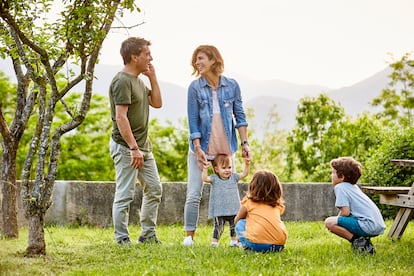How parenthood protects the brain from the effects of aging
A new study shows that spending years raising and caring for children produces benefits not just in mothers but in any caregiver

Many developed countries have a regressive population pyramid, with low birth and death rates. For primarily economic reasons, young couples are reluctant to have children. We are an aging society, and if nothing is done about it, we will become even more so. Governments are working hard to establish material and economic incentives to promote natural population growth, but now neuroscience can also contribute to this with a powerful argument: the positive effects on the health of potential parents.
In recent years, there has been no shortage of research highlighting the neuroprotective changes — structural and functional — that occur in a woman’s brain during pregnancy and how these changes can affect the rest of her life. Now, new research shows us that, beyond pregnancy itself, changes related to parenthood — that is, spending years raising and caring for children — amplify the benefits to the brain. And not only for mothers, but also for fathers and any educators who take on the responsibility of raising kids.
A study called Protective role of parenthood on age-related brain function in mid- to late-life, carried out by a group of researchers from universities in the U.S., Singapore and Australia and recently published in the prestigious journal Proceedings of the National Academy of Science, used complex statistical techniques and functional magnetic resonance imaging to investigate the relationship between the number of children raised and brain connectivity and function according to age in 19,964 women and 17,607 men from a British biomedical data source (UK Biobank).
Their results clearly show that the number of children raised is “associated with higher brain-wide functional connectivity, especially in networks associated with movement and sensation [...] These results suggest that parenthood may be neuroprotective in later life.”
Furthermore, in both female and male caregivers, the intrinsic neuronal architecture of the brain and its neuronal connectivity positively correlated with the number of children being raised, but negatively correlated with age. That is, the greater the number of children raised, the better the neuronal connectivity and brain function, counteracting the natural changes due to aging itself. Parenthood, therefore, seems to protect the brain from the loss of structural and functional connectivity associated with old age.
Sign up for our weekly newsletter to get more English-language news coverage from EL PAÍS USA Edition
Tu suscripción se está usando en otro dispositivo
¿Quieres añadir otro usuario a tu suscripción?
Si continúas leyendo en este dispositivo, no se podrá leer en el otro.
FlechaTu suscripción se está usando en otro dispositivo y solo puedes acceder a EL PAÍS desde un dispositivo a la vez.
Si quieres compartir tu cuenta, cambia tu suscripción a la modalidad Premium, así podrás añadir otro usuario. Cada uno accederá con su propia cuenta de email, lo que os permitirá personalizar vuestra experiencia en EL PAÍS.
¿Tienes una suscripción de empresa? Accede aquí para contratar más cuentas.
En el caso de no saber quién está usando tu cuenta, te recomendamos cambiar tu contraseña aquí.
Si decides continuar compartiendo tu cuenta, este mensaje se mostrará en tu dispositivo y en el de la otra persona que está usando tu cuenta de forma indefinida, afectando a tu experiencia de lectura. Puedes consultar aquí los términos y condiciones de la suscripción digital.









































